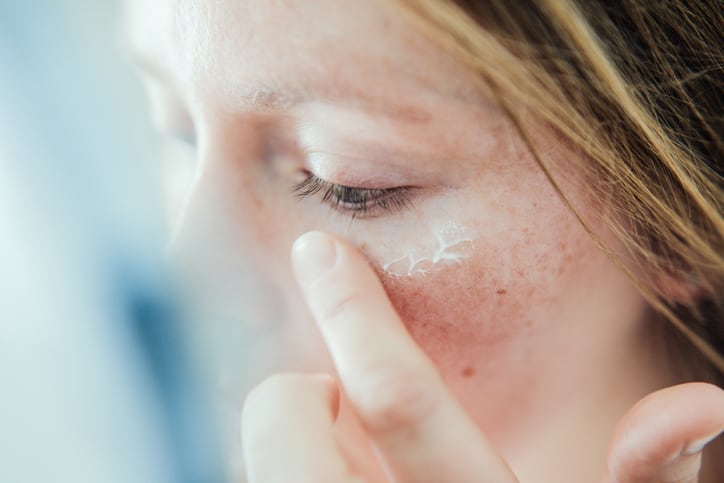Writing in its international patent, Beiersdorf said the skin profiling method, powered by smart algorithms and Artificial Intelligence (AI), enabled highly personalised cosmetic, skin care and dermatological product recommendations for basic and prevailing skin conditions. Ideally, these recommendations could be “preventative”; suggesting products that minimised or prevented a skin problem, it said.
Air pollution, weather and time of day ‘important’ to basic skin condition
Whilst there were already several methods on the market used to recommend beauty and personal care products for specific skin conditions, based on specific parameters like moisture, roughness, irregular colour distribution and skin impurities, Beiersdorf said these methods all had one common disadvantage: errors.
“A disadvantage of all known methods (…) is that the skin condition determined exclusively from skin parameters is subject to major errors. For example, the ambient temperature and/or humidity have a major influence on the blood circulation (reddening of the skin) and on the gloss of the skin (reflective behaviour of the skin). Stress factors such as physical and/or emotional stress and/or environmental influencers are also expressed in deviations from the skin condition from the normal condition without these stresses,” the company wrote in its patent filing.
“In particular, the inclusion of environmental influences such as air pollution, weather (solar radiation or rain), time of day is important in order to determine the basic skin condition,” it said.
‘Basic’, ‘environmental’ and ‘personal’ data
Beiersdorf’s skin profiling method used three data sets to make product recommendations: basic data, environmental data and personal data.
‘Basic’ data, it said, was compiled using a digital image of the skin area taken with a mobile phone camera; a moisture measurement taken using a moisture sensor device; and geographic coordinates noted to identify consumer location, obtained using a GPS receiver.
Preferably, the ambient temperature and/or air humidity of where the image and moisture measurements were taken was also recorded. It was also preferable a series of images were taken: a white light recording, fluorescence recording and cross-polarised image versus just one.
“From the cross-polarized image, knowledge and measurement results can be derived from the upper skin layers within the skin, because this looks, so to speak, under the uppermost skin layer, since there is no reflection of the light on the skin surface. Using blue light, certain protein structures lying on the surface of the skin can be stimulated and their number can be determined from the light emitted. This is a sign of a colonisation of the skin surface with bacteria,” Beiersdorf said.
‘Environmental data’ based on geographic location could then be added, the company said, including aspects like pollen count, pollution and weather – the latter being especially important as it influenced overall skin condition.
‘Personal data’ collected via a mobile device survey, including age, ethnic origin, hormonal status, and any health conditions a person may have such as diabetes or high blood pressure, could then also be added to the analysis, it said.
This final profile was then entered into a large-scale database to be compared against a range of existing skin profiles or “inventory data” that were each already assigned to specific products and classifications, Beiersdorf said.
Personalised skin care investments and R&D
Beiersdorf had already taken clear steps towards advancing its presence in personalised skin care this year, notably via the launch of its AI-powered personalised vegan face care range Only What’s Needed O.W.N – a concept the current patent aligned closely to.
O.W.N blended formulas based on individual skin needs using a proprietary algorithm and scientific questionnaire, considering skin condition, lifestyle and environmental factors like humidity, weather conditions and exposure to pollutant. The algorithm and questionnaire had been built around insights and data from a survey of 4,000+ consumers conducted in the run-up to the brand launch, part of Beiersdorf’s wider international scientific study Skinly of 10,000 women across Europe and Asia that was collecting skin measurement data on a daily basis.
“Personalisation is a major trend in many industries, including in cosmetics, and Beiersdorf has been working on various concepts and products over the past years,” said Dr. Frank Schwanke, manager of the personalisation accelerator at Beiersdorf, at the time of the launch.
“…For us, it is essential that we provide our consumers with an innovative and personalised offer in the field of skin care that adds true value to their skin care routine. O.W.N delivers sophisticated skin care with a simple routine, that’s effective on the skin and good to the planet,” Schwanke said.
Beiersdorf also announced its co-investment in Dutch personalised beauty startup Routinely back in May, this year. The co-investment, alongside independent venture capital fund 9.5 Ventures, resulted in the launch of Routinely’s personalised skin care app and range of 13 unisex serums, selected and bundled according to consumer needs after completion of an online questionnaire. Consumers then received ongoing, real-time guidance via the brand’s app that enabled them to “track, review and refine” skin care routines, with a plethora of measurements considered including air quality and solar radiation.
At the time, Ascan Voswinckel, head of OSCAR&PAYL Beiersdorf Venture Capital, said the startup aligned well with current skin care trends: “We know from comprehensive feedback and studies how relevant personalised skin care is to the consumer. …Our investment in Routinely also reflects the potential we see in serving the increased online consumer demand – a trend that has been further reinforced by the coronavirus pandemic.”
WIPO International Patent No. WO/2021/180400
Published on: September 16, 2021. Filed on: February 3, 2021.
Title: “Product recommendation method”
Inventors: Beiersdorf AG – S. Clemann et al.


